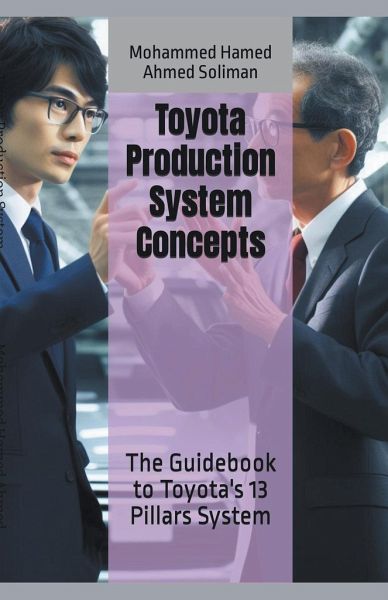
The Guidebook to Toyota's 13 Pillars System - Series Books 7 to 17

PAYBACK Punkte
12 °P sammeln!
Master the full depth of the Toyota Production System (TPS) with this essential guidebook series-Books 7 to 17, bundled in one powerful collection. Designed for lean practitioners, managers, engineers, and students of operations excellence, this box set explores the foundational principles that transformed Toyota into the most efficient automaker in the world. Rooted in just-in-time (JIT) and jidoka (built-in quality), TPS is much more than a manufacturing tool-it's a philosophy of continuous improvement, flow, and respect for people. This book set breaks down Toyota's 13 core pillars and show...
Master the full depth of the Toyota Production System (TPS) with this essential guidebook series-Books 7 to 17, bundled in one powerful collection. Designed for lean practitioners, managers, engineers, and students of operations excellence, this box set explores the foundational principles that transformed Toyota into the most efficient automaker in the world. Rooted in just-in-time (JIT) and jidoka (built-in quality), TPS is much more than a manufacturing tool-it's a philosophy of continuous improvement, flow, and respect for people. This book set breaks down Toyota's 13 core pillars and shows how they work together to eliminate waste, ensure quality, and increase productivity. You'll discover:The historical roots of TPS-from Sakichi Toyoda's self-stopping loom to Taiichi Ohno's system-wide innovations after WWII How Kiichiro Toyoda developed the Just-in-Time concept to eliminate overproduction How Toyota built a system of continuous improvement (kaizen) using the PDCA scientific method Why jidoka empowers machines and people to prevent defects in real-time How TPS principles apply not just in Japan-but across global industries This box set includes Books 7 through 17 in the TPS Series-perfect for professionals who want to accelerate learning and drive lean transformation in their own organizations. If you're serious about understanding the thinking behind Toyota's success and want a practical, in-depth, and historical overview, this set will guide you through the full system step by step.













